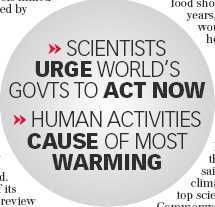
PARIS: The world’s climate experts urge world governments to heed the most wideranging scientific assessment so far of a human link to global warming and agree on prompt action to slow the trend. A draft of the United Nations’ climate report projects a big rise in temperatures this century and warns of more heatwaves, floods,
droughts and rising sea levels linked to greenhouse gases released by burning of fossil fuels. “I hope policies and action will be formed to address the problem,” said Rajendra Pachauri, the chairman of the Intergovernmental Panel on Climate Change (IPCC).“I think based on the awareness that is growing very rapidly in every part of the globe, you will see a certain political resolve developing,” he said. The report, the fourth of its kind, is undergoing a final review by governments and scientists before its release on Friday.
It draws on research by 2,500 scientists from more than 130 countries and has taken six years to compile. Among its shocking conclusions: » There is at least a 90% probability that human activities are to blame for most of the warming in the past 50 years. The previous report, in 2001, rated the probability at just 66%. » Rising temperatures will leave millions more people hungry by 2080 and cause critical water shortages in China and Australia, as well as parts of Europe and
the United States. » By the end of the century, climate change will bring water scarcity to between 1.1 and 3.2 billion people as temperatures rise by 2º-3ºC. » An additional 200 million to 600 million people across the world would face food shortages in another 70 years, while coastal flooding would hit another 7 million
homes. “The message is that every region of the earth will have exposure,”said Dr Graeme Pearman, who helped draft the report.“If you look at China,like Australia they will lose significant rainfall in their agricultural areas,”said Pearman, the former
climate director of Australia’s top science body, the Commonwealth Scientific and
Industrial Research Organisation.Africa and poor countries such as Bangladesh would be most affected because they were least able to cope with greater coastal damage and drought, said Pearman.The IPCC was set up in 1988 by the World Meteorological Organisation and the UN Environment Programme to guide policy makers on the impact of climate change.
2 comments:
cuaca skg mmg da tak menentu
haihhhh
penin
hehe...tu psl
besala,dh nak kiamat..
Post a Comment